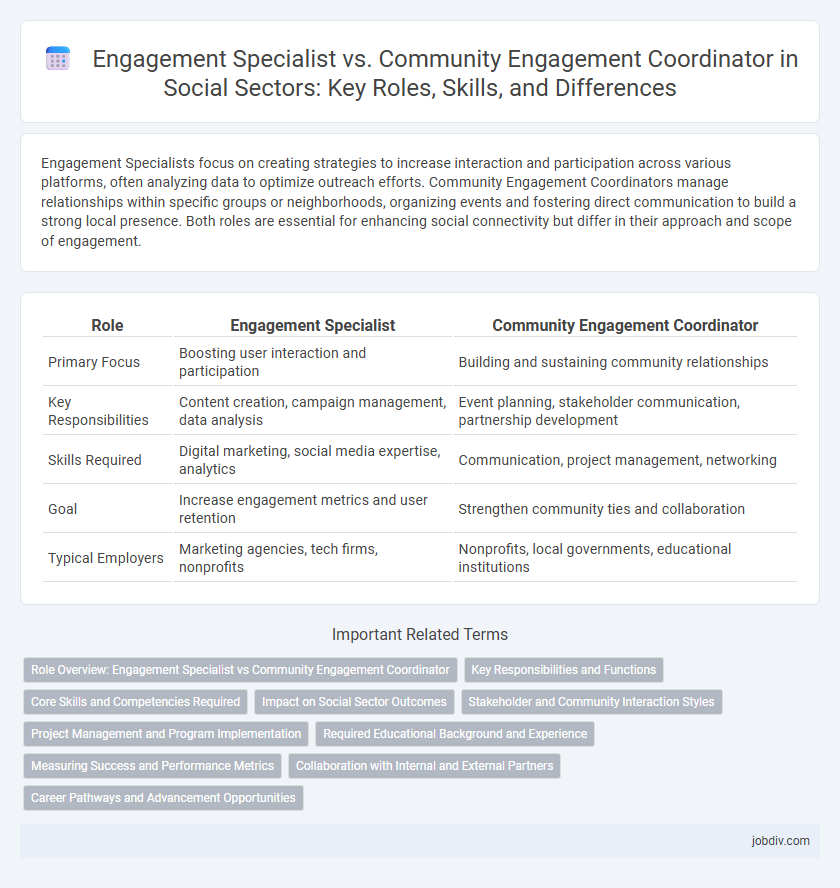Engagement Specialists focus on creating strategies to increase interaction and participation across various platforms, often analyzing data to optimize outreach efforts. Community Engagement Coordinators manage relationships within specific groups or neighborhoods, organizing events and fostering direct communication to build a strong local presence. Both roles are essential for enhancing social connectivity but differ in their approach and scope of engagement.
Table of Comparison
| Role | Engagement Specialist | Community Engagement Coordinator |
|---|---|---|
| Primary Focus | Boosting user interaction and participation | Building and sustaining community relationships |
| Key Responsibilities | Content creation, campaign management, data analysis | Event planning, stakeholder communication, partnership development |
| Skills Required | Digital marketing, social media expertise, analytics | Communication, project management, networking |
| Goal | Increase engagement metrics and user retention | Strengthen community ties and collaboration |
| Typical Employers | Marketing agencies, tech firms, nonprofits | Nonprofits, local governments, educational institutions |
Role Overview: Engagement Specialist vs Community Engagement Coordinator
Engagement Specialists focus on fostering meaningful interactions by designing targeted outreach strategies and analyzing participant responses to enhance program effectiveness. Community Engagement Coordinators manage relationships with local stakeholders, organize events, and facilitate collaborative efforts to strengthen community ties and support organizational goals. Both roles require strong communication skills but differ in scope, with Engagement Specialists emphasizing strategic engagement metrics and Coordinators prioritizing hands-on community partnership development.
Key Responsibilities and Functions
Engagement Specialists focus on developing and implementing strategies to increase participation and foster meaningful interactions across digital platforms and physical events, emphasizing targeted outreach and impact measurement. Community Engagement Coordinators manage relationships within local communities by organizing programs, facilitating communication between stakeholders, and supporting collaborative initiatives to enhance community development. Both roles prioritize relationship building but differ in scope, with Specialists targeting broader engagement metrics and Coordinators concentrating on localized, direct community involvement.
Core Skills and Competencies Required
Engagement Specialists must excel in communication strategies, data analysis, and relationship management to foster strong connections and measure engagement impact. Community Engagement Coordinators require proficiency in event planning, stakeholder collaboration, and grassroots outreach to mobilize community involvement effectively. Both roles demand adaptability, cultural competence, and project management skills to drive social initiatives successfully.
Impact on Social Sector Outcomes
Engagement Specialists drive meaningful connections by developing strategic outreach campaigns that increase participation and awareness within target populations, directly enhancing program effectiveness in the social sector. Community Engagement Coordinators focus on fostering trust and collaboration among local stakeholders, facilitating partnerships that support sustained community development and resource sharing. Both roles significantly improve social sector outcomes by leveraging tailored engagement methods to mobilize communities and optimize service delivery.
Stakeholder and Community Interaction Styles
Engagement Specialists prioritize personalized interactions and strategic communication with high-level stakeholders to foster strong, goal-oriented partnerships. Community Engagement Coordinators focus on broad community involvement through inclusive events and grassroots outreach, ensuring diverse voices are heard and represented. Both roles require tailored engagement styles, with Specialists emphasizing targeted influence and Coordinators promoting widespread community participation.
Project Management and Program Implementation
Engagement Specialists excel in project management by designing targeted campaigns that drive stakeholder interaction, often utilizing data analytics to optimize engagement outcomes. Community Engagement Coordinators focus on program implementation by organizing local events and facilitating partnerships that foster community involvement and support. Both roles require strong communication skills, but Engagement Specialists prioritize strategic planning while Community Engagement Coordinators emphasize hands-on execution of engagement initiatives.
Required Educational Background and Experience
Engagement Specialists typically require a bachelor's degree in communications, marketing, or social sciences, along with 3-5 years of experience in client relations or community outreach. Community Engagement Coordinators often hold degrees in public administration, social work, or nonprofit management, with 2-4 years of hands-on experience in organizing community programs and stakeholder collaboration. Both roles demand strong interpersonal skills, but Engagement Specialists lean more toward strategic communication, while Coordinators focus on grassroots mobilization and event coordination.
Measuring Success and Performance Metrics
Engagement Specialists typically measure success using KPIs such as participation rates, social media interactions, and campaign reach to evaluate community impact. Community Engagement Coordinators often track metrics like event attendance, stakeholder feedback, and partnership growth to assess program effectiveness. Both roles rely on data analytics and surveys to optimize engagement strategies and demonstrate tangible outcomes.
Collaboration with Internal and External Partners
Engagement Specialists focus on fostering strong relationships by collaborating with both internal teams and external partners to drive community involvement and support organizational goals. Community Engagement Coordinators manage and coordinate outreach initiatives, ensuring alignment between community needs and internal resources through effective partnerships. Both roles emphasize strategic communication and partnership-building to enhance engagement outcomes.
Career Pathways and Advancement Opportunities
Engagement Specialists often focus on developing and executing strategies to boost stakeholder involvement, requiring strong skills in communication and data analysis, which pave the way for advancement into senior roles like Engagement Manager or Director of Community Relations. Community Engagement Coordinators typically manage local outreach programs and build partnerships with community organizations, gaining experience that supports progression to positions such as Program Manager or Community Development Director. Both roles offer distinct career pathways emphasizing leadership growth, project management, and strategic planning within social impact and nonprofit sectors.
Engagement Specialist vs Community Engagement Coordinator Infographic

 jobdiv.com
jobdiv.com